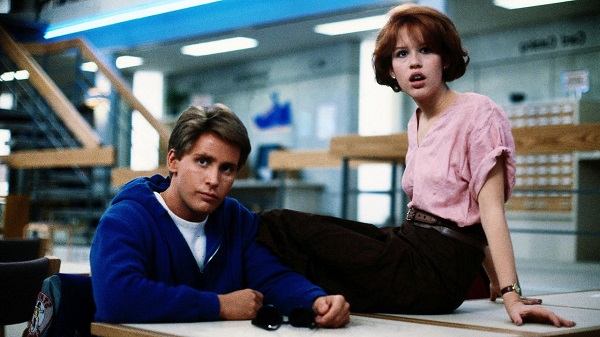In 1984, the world was introduced to a director who would leave a monumental impact on the American film industry. John Hughes made his writer-directorial debut with the underdog comedy Sixteen Candles. Having already written films such as Mr. Mom and National Lampoon’s Vacation, Hughes took his filmmaking one step further by directing the story of a high school student whose entire family has forgotten her 16th birthday.
In Sixteen Candles, Samantha Baker (Molly Ringwald) opens up to a nerdy admirer, aptly named the Geek (Anthony Michael Hall), about how anti-climactic her birthday has been. “It’s physcially impossible for me to get happy,” Sam says mournfully. The conversation is so simple yet conveys brilliantly what many teens feel.
The Breakfast Club, arguably Hughes’ most well known film, occurs predominantly within a single room with only five characters and the stories they share. His script, memorized by the masses, has found its niche within the crevices of angsty teen tumblrs. Although the fashion and pop culture references are outdated, the emotions and struggles have not. In the final scene, the cast says, “each one of us is a brain, and an athlete, and a basket case, a princess, and a criminal.” The scene of the five teenagers sitting together on the library floor has just as much significance and emotion now as it did in 1985.
Many actors, including Ringwald and Hall, worked with Hughes multiple times and helped to brand the unique image of his career. Dubbed the Brat Pack, these actors took on a ‘girl- or boy-next-door’ persona that allowed viewers to connect with their characters.
Fast-forward to today, films directed towards teens are the antithesis to Hughes’ pragmatic plotlines. In 2012, Lionsgate Films released the anticipated film based on the book series by Suzanne Collins, The Hunger Games. The dystopian-future film enthralled audiences with its morbid content and surreal effects. For almost five years, the film franchise has found success amongst a young adult demographic and earned approximately $1.5 billion in the box office worldwide. Similar franchises, such as Divergent and Twilight, have also found great success in this genre with a heroine caught in a tense love triangle. These modern day teen films bypass the need for a relatable plot or character with grandiose stories and big action. Even films that are relatively true to life find themselves exaggerated in their plots and logistics, such as the recent films The Duff and The Fault in Our Stars.
A sense of defeatism surrounds the millennial generation. As adolescents embark into adulthood, many feel the weight of teenage struggles that are unique to the current world. The over abundances of blockbuster films today fail to present the poignancy of realism. Rather than recognizing the success of past directors, modern day filmmakers are driving themselves further from the truthfulness that cinema is craving. By taking a step back from the fantastical and science fiction, perhaps filmmakers can create cinema for the current generation that is as applicable as Hughes’. His films serve to remind those who are struggling that these problems such as adversity or ennui have been faced before. By allowing the complexity of true adolsecent emotion to speak for itself, Hughes created relatable and lovable characters that we all need. The feelings don’t just fade away, which is why his films possess a sense of timelessness. His ability to capture what is often overlooked by today’s film viewers is his realistic portrayals. Special effects, shock-value comedy, or outlandish plots were almost obsolete to Hughes; he allowed his movies to focus on the words that are just as powerful today as the were 30 years ago.








